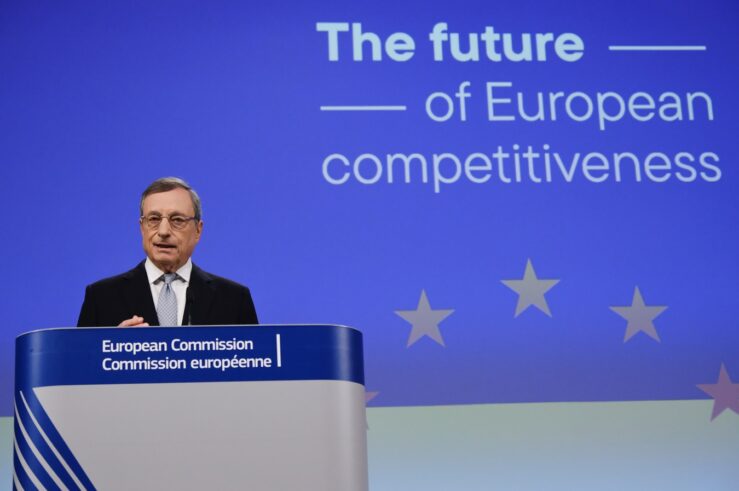Draghi Report Highlights Why to Be Wary of the ‘Brussels Effect’
Everyone in Europe, and across the international competition-law sphere, seems to have their own interpretation these days of former Italian Prime Minister and European Central Bank President Mario Draghi’s recent report “The Future of European Competitiveness” (a.k.a., the “Draghi report”). And, of course, those various interpretations, unsurprisingly, inevitably match the interpreter’s policy preferences. This is ... Draghi Report Highlights Why to Be Wary of the ‘Brussels Effect’
A Primer (and Some Questions) About the RealPage Antitrust Case
The U.S. Justice Department (DOJ) and several states filed suit late last month against the property-management software firm RealPage Inc. for its “unlawful scheme to decrease competition among landlords in apartment pricing and to monopolize the market for commercial revenue management software that landlords use to price apartments.” While this is not the first case ... A Primer (and Some Questions) About the RealPage Antitrust Case
Don’t Believe the Hype (on Competition and AI)
As in the Public Enemy song that gives this post its title, the hype about alleged competition risks in the artificial intelligence (AI) “market” is a sequel—and not a good one—to the hyperbolic and dystopian view that has informed several recent antitrust-policy proposals and demands for tougher enforcement of competition laws, particularly in digital markets. ... Don’t Believe the Hype (on Competition and AI)
Ms Vestager: Do Not Tear Down This Wall
The European Commission appears resolved to tear down Apple’s “walled garden.”[1] Following a complaint filed by Spotify, the Commission has already fined Apple an exorbitant €1.8 billion for allegedly abusing its dominant position in the market for distributing streaming-music apps to iPhone and iPad users (a case where Apple was found to be dominant in ... Ms Vestager: Do Not Tear Down This Wall
AI Partnerships and Competition: Much Ado About Nothing?
Competition policymakers around the world have been expressing concerns about competition in emerging artificial-intelligence (AI) industries, with some taking steps to investigate them further. These fears are notably fueled by a sense that incumbent (albeit, in adjacent markets) digital platforms may use strategic partnerships with AI firms to stave off competition from this fast-growing field. ... AI Partnerships and Competition: Much Ado About Nothing?
DOJ’s Case Against Apple: Beware of Forcing ‘Efficiencies’
The U.S. Justice Department’s (DOJ) recent complaint charging Apple with monopolizing smartphone markets is, according to Assistant U.S. Attorney General Jonathan Kanter, intended as a contribution to the agency’s “enduring legacy of taking on the biggest and toughest monopolies in history.” Unfortunately, the case has fundamental weaknesses in its assessment of both Apple’s alleged monopoly ... DOJ’s Case Against Apple: Beware of Forcing ‘Efficiencies’
Mi Mercado Es Su Mercado: The Flawed Competition Analysis of Mexico’s COFECE
Mexico’s Federal Economic Competition Commission (COFECE, after its Spanish acronym) has published the preliminary report it prepared following its investigation of competition in the retail electronic-commerce market (e.g., Amazon). The report finds that: there are elements to preliminarily determine that there are no conditions of effective competition in the Relevant Market of Sellers and in ... Mi Mercado Es Su Mercado: The Flawed Competition Analysis of Mexico’s COFECE
From Europe, with Love: Lessons in Regulatory Humility Following the DMA Implementation
The European Union’s implementation of the Digital Markets Act (DMA), whose stated goal is to bring more “fairness” and “contestability” to digital markets, could offer some important regulatory lessons to those countries around the world that have been rushing to emulate the Old Continent. The first regards “regulatory humility.” Designing ex ante regulation to promote ... From Europe, with Love: Lessons in Regulatory Humility Following the DMA Implementation
In Reforming Its Antitrust Act, Argentina Should Not Ignore Its Institutional Achilles Heel
As part of a set of “shock therapy” measures introduced to deregulate and stabilize its economy, the Argentinian government led by newly elected President Javier Milei has already adopted an emergency decree (Decreto de Necesidad y Urgencia) that makes broad array of legal changes. Toward the same goal, the government in late December sent up ... In Reforming Its Antitrust Act, Argentina Should Not Ignore Its Institutional Achilles Heel
Latin America Should Follow Its Own Path on Digital-Markets Competition
In order to promote competition in digital markets,[1] Latin American countries should not copy and paste “solutions” from other jurisdictions, but rather design their own set of policies. In short, Latin American countries—like my own, Peru—should not “put the cart before the horse” and regulate markets that are not yet mature. Digital or “tech” markets ... Latin America Should Follow Its Own Path on Digital-Markets Competition
Does ‘Open Finance’ Promote Competition or Facilitate Free Riding?
Financial technology, or so-called “fintech,” is disrupting the financial sector, and that’s a good thing. Fintech services are making finance more digital and more user-friendly. This, in turn, has led to reduced transactions costs and increased levels of competition, innovation, and financial inclusion. Alas, the emergence of fintech has also been accompanied by a rising ... Does ‘Open Finance’ Promote Competition or Facilitate Free Riding?
No, Mergers Are Not Like ‘The Ultimate Cartel’
There is a line of thinking according to which, without merger-control rules, antitrust law is “incomplete.”[1] Without such a regime, the argument goes, whenever a group of companies faces with the risk of being penalized for cartelizing, they could instead merge and thus “raise prices without any legal consequences.”[2] A few months ago, at a ... No, Mergers Are Not Like ‘The Ultimate Cartel’
















